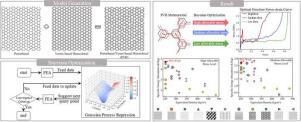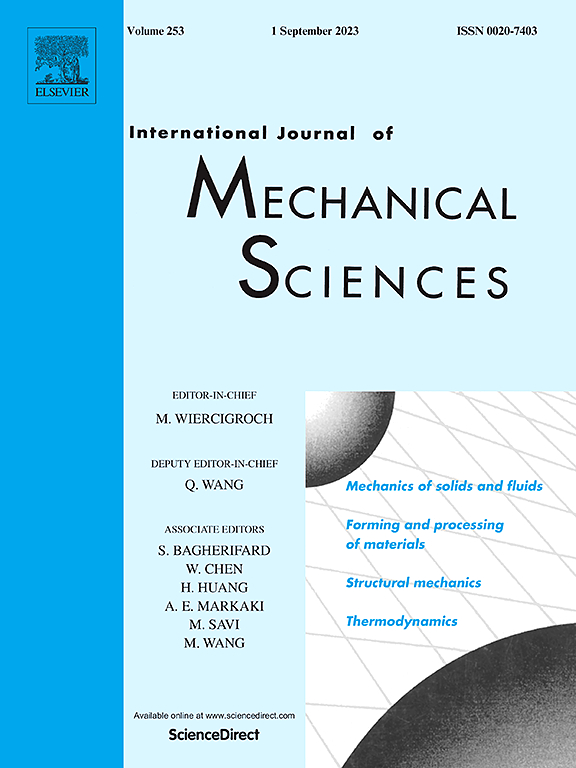Bio-inspired perturbated hierarchical mechanical metamaterial for energy absorption
IF 9.4
1区 工程技术
Q1 ENGINEERING, MECHANICAL
International Journal of Mechanical Sciences
Pub Date : 2025-09-23
DOI:10.1016/j.ijmecsci.2025.110847
引用次数: 0
Abstract
Mechanical metamaterials inspired by the disordered and hierarchical structure of natural materials show promising potential in enhancing stress dissipation, damage tolerance and energy absorption. However, translating these bio-inspired principles into tunable and manufacturable architectures remains a critical challenge, requiring advances in multiscale design and predictive modeling. To mimic nature’s ability to balance structural disorder with hierarchy, a computationally driven metamaterial design that integrates controlled random perturbations with periodic hierarchical unit cells is presented. This design exploits the sequential collapse behavior of hierarchical structures and perturbation-induced post-yielding hardening to improve energy absorption capacity under predefined allowable stress constraints, optimized through Bayesian methods. The optimized metamaterials achieve increases in energy absorption of up to 112.7% and 46.8% at different allowable stress levels, compared to a baseline structure. These results demonstrate that controlled disorder enhances mechanical performance and enables a new paradigm for tunable, non-periodic metamaterials under varied application conditions.

用于能量吸收的仿生微扰分层机械超材料
受天然材料的无序和分层结构的启发,机械超材料在增强应力耗散、损伤容限和能量吸收方面具有广阔的应用前景。然而,将这些受生物启发的原理转化为可调和可制造的架构仍然是一个关键的挑战,需要在多尺度设计和预测建模方面取得进展。为了模拟自然界平衡结构无序与层次结构的能力,提出了一种计算驱动的超材料设计,该设计将受控随机扰动与周期性层次单元胞相结合。该设计利用分层结构的顺序崩溃行为和微扰诱导的屈服后硬化来提高在预定义的许用应力约束下的能量吸收能力,并通过贝叶斯方法进行优化。与基准结构相比,优化后的超材料在不同允许应力水平下的能量吸收率分别提高了112.7%和46.8%。这些结果表明,可控无序增强了机械性能,并为各种应用条件下的可调谐非周期超材料提供了新的范例。
本文章由计算机程序翻译,如有差异,请以英文原文为准。
求助全文
约1分钟内获得全文
求助全文
来源期刊

International Journal of Mechanical Sciences
工程技术-工程:机械
CiteScore
12.80
自引率
17.80%
发文量
769
审稿时长
19 days
期刊介绍:
The International Journal of Mechanical Sciences (IJMS) serves as a global platform for the publication and dissemination of original research that contributes to a deeper scientific understanding of the fundamental disciplines within mechanical, civil, and material engineering.
The primary focus of IJMS is to showcase innovative and ground-breaking work that utilizes analytical and computational modeling techniques, such as Finite Element Method (FEM), Boundary Element Method (BEM), and mesh-free methods, among others. These modeling methods are applied to diverse fields including rigid-body mechanics (e.g., dynamics, vibration, stability), structural mechanics, metal forming, advanced materials (e.g., metals, composites, cellular, smart) behavior and applications, impact mechanics, strain localization, and other nonlinear effects (e.g., large deflections, plasticity, fracture).
Additionally, IJMS covers the realms of fluid mechanics (both external and internal flows), tribology, thermodynamics, and materials processing. These subjects collectively form the core of the journal's content.
In summary, IJMS provides a prestigious platform for researchers to present their original contributions, shedding light on analytical and computational modeling methods in various areas of mechanical engineering, as well as exploring the behavior and application of advanced materials, fluid mechanics, thermodynamics, and materials processing.
 求助内容:
求助内容: 应助结果提醒方式:
应助结果提醒方式:


